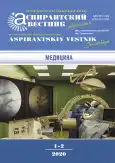Negative outcome predictors of West syndrome
- Authors: Prygunova T.M.1, Antipenko E.A.2, Mukhin K.Y.3
-
Affiliations:
- Nizhny Novgorod State Children’s Clinical Hospital
- Privolzhsky Research Medical University
- St. Luka’s Institute of Child and Adult Neurology and Epilepsy
- Issue: Vol 20, No 1-2 (2020)
- Pages: 68-74
- Section: Clinical Medicine
- URL: https://journal-vniispk.ru/2410-3764/article/view/54483
- DOI: https://doi.org/10.17816/2072-2354.2020.20.1.68-74
- ID: 54483
Cite item
Full Text
Abstract
West syndrome is infantile epileptic encephalopathy characterized by the triad of symptoms: infantile spasms, changes in the electroencephalogram (EEG) in the form of hypsarrhythmia and psychomotor retardation. Revealing of the predictors of clinical outcome can contribute to the selection of the optimal therapy and determine the terms of dynamic monitoring and improve treatment outcome.
Aim: to identify predictors of West syndrome outcome.
Materials and methods. The study included 132 patients who underwent treatment from 2000 to 2018. At the onset of the observation the age of children was from 5 months to 17 years 11 months. The age of the onset of spasms ranged from 1 day to 3 years 2 months. Depending on the etiological factor patients were divided into 3 groups: group 1 — patients with a structural form (60 patients; 45.5%), group 2 — patients with a genetic form (39 children; 29.5%), group 3 — patients with the disease of unknown etiology (33 children; 25.0%). Evaluating the treatment, special attention was paid to the effectiveness of the first three lines of AEDs and hormones, as well as the further selection of AEDs.
Results. Epileptic spasms were controlled in 76 children (57.6%), all seizures were controlled in 48 (36.4%) children. Patients of the 3rd group demonstrated a higher frequency of spasms arresting (87.9% in comparison to 48.7 and 46.7%) and complete remission (72.7% in comparison to 26.7 and 27.6% respectively). Normal neuropsychic development before the onset of spasms, the absence of epi-activity or the presence of regional epi-activity on the EEG in dynamics, the presence of diffuse changes in MRI had positive prognostic value for spasms control. Neonatal seizures, the presence of epi-activity on the EEG and focal deficiency before spasms, the presence of other seizures, pathology of vision and hearing, and necessity to use ≥2 drugs had negative prognostic value. The best compensation of motor and psychoverbal development was noted in patients who had remission.
Conclusions. Predictors of negative outcome of West syndrome include structural and genetic forms of the disease, neonatal seizures, epi-activity on EEG, impaired neuropsychic development and the focal pathology before spasms, the presence of other seizures, the persistence of epi-activity in dynamics and the absence of the first-line therapy effect.
Keywords
Full Text
##article.viewOnOriginalSite##About the authors
Tatiana M. Prygunova
Nizhny Novgorod State Children’s Clinical Hospital
Author for correspondence.
Email: p-tanchita@yandex.ru
neurologist
Russian Federation, Nizhny NovgorodElena A. Antipenko
Privolzhsky Research Medical University
Email: antipenkoea@gmail.com
Doctor of Medical Science, Associate Professor, Head of the Neurology, Psychiatry and Narcology Department of FAPE
Russian Federation, Nizhny NovgorodKonstantin Yu. Mukhin
St. Luka’s Institute of Child and Adult Neurology and Epilepsy
Email: center@epileptologist.ru
Doctor of Medical Science, Professor, Head of Institute
Russian Federation, MoscowReferences
- Мухин К.Ю., Миронов М.Б. Эпилептические спазмы // Русский журнал детской неврологии. – 2014. – Т. 9. – № 4. – С. 20–29. [Mukhin KYu, Mironov MB. Epileptic spasms. Russian Journal of Child Neurology. 2014;9(4):20-29. (In Russ.)]. https://doi.org/10.17650/ 2073-8803-2014-9-4-20-29.
- Мухин К.Ю., Петрухин А.С., Холин А.А. Эпилептические энцефалопатии и схожие синдромы у детей. — М.: АртСервис Лтд, 2011. — С. 95–156. [Mukhin KYu, Petrukhin AS, Holin AA. Epilepticheskie entsefalopatii i skhozhie sindromy u detey. Moscow: ArtServis Ltd; 2011. P. 95-156. (In Russ.)]
- Fois A. Infantile spasms: review of the literature and personal experience. Ital J Pediatr. 2010;36:15. https://doi.org/10.1186/1824-7288-36-15.
- Hamano S, Yoshinari S, Higurashi N, et al. Developmental outcomes of cryptogenic West syndrome. J Pediatr. 2007;150(3):295-299. https://doi.org/10.1016/j.jpeds. 2006.12.004.
- Karvelas G, Lortie A, Scantlebury MH, et al. A retrospective study on aetiology based outcome of infantile spasms. Seizure. 2009;18(3):197-201. https://doi.org/10.1016/j.seizure.2008.09.006.
- Lux AL. West & son: the origins of West syndrome. Brain Dev. 2001;23(7):443-446. https://doi.org/10.1016/s0387-7604(01)00266-2.
- Mohamed BP, Scott RC, Desai N, et al. Seizure outcome in infantile spasms – A retrospective study. Epilepsia. 2011;52:746-752. https://doi.org/10.1111/j.1528-1167. 2010.02963.x.
- Nabbout R, Melki I, Gerbaka B, et al. Infantile spasms in down syndrome: good response to a short course of vigabatrin. Epilepsia. 2001;42:1580-1583. https://doi.org/10.1046/j.1528-1157.2001.13501.x.
- Nikolić D, Ivanovski P, Bogićević D, et al. [Evaluation of psycho-motor development in children with West syndrom. (In Serbian)]. Srp Arh Celok Lek. 2012;140(5-6): 278-284. https://doi.org/10.2298/sarh1206278n.
- Pellock JM, Hrachovy R, Shinnar S, et al. Infantile spasms: A U. S. consensus report. Epilepsia. 2010;51:2175-2189. https://doi.org/10.1111/j.1528-1167.2010.02657.x.
- Riikonen R. Epidemiological data of West syndrome in Finland. Brain Dev. 2001;23(7):539-541. https://doi.org/10.1016/s0387-7604(01)00263-7.
- Riikonen RS. Favourable prognostic factors with infantile spasms. Eur J Paediatr Neurol. 2010;14(1):13-18. https://doi.org/10.1016/j.ejpn.2009.03.004.
- Riikonen R. Long-term outcome of patients with West syndrome. Brain Dev. 2001;23(7):683-687. https://doi.org/10.1016/s0387-7604(01)00307-2.
- Shields WD. Infantile spasms: little seizures, BIG consequences. Epilepsy Currents. 2006;6(3):63-69. https://doi.org/10.1111/j.1535-7511.2006.00100.x.
- Yilmaz S, Tekgul H, Serdaroglu G, et al. Evaluation of ten prognostic factors affecting the outcome of West syndrome. Acta Neurol Belg. 2016;116(4):519-527. https://doi.org/10.1007/s13760-016-0611-8.
Supplementary files







